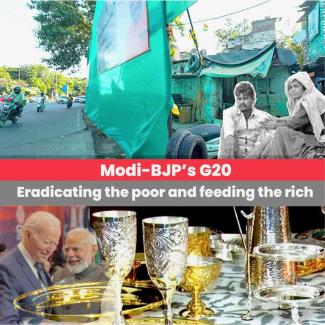A year-long series of G20 events spread over India's vast and diverse urban landscape concluded with the 18th summit meeting in New Delhi on 8-10 September. Since this was the first such major international event hosted by India after the 1983 Non-Aligned Movement summit and the 2010 Commonwealth Games, it understandably attracted a great deal of public attention not just in India but also internationally.
Unlike G7, G20 is not a cozy club of the world's richest countries, it has several developing countries or emerging economies from the Global South. With the inclusion of the African Union, a continental coalition of 55 African countries, and the consequent expansion of G20 to G21, the Delhi summit has actually widened the representation of the Global South in this intercontinental forum. Since India often positions itself as a leading voice of the Global South, the Delhi summit could well be expected to bring the pressing problems of the Global South to a sharper focus. But the Delhi summit has conspicuously been bereft of any such focus.
In fact, the Modi regime took great pains to conceal India's own poverty. The G20 triggered a massive anti-poor eviction drive in and around Delhi. The government probably believes that the existence of the urban poor and toiling people is an eyesore that has to be rendered invisible during any international event or during the visit of any foreign dignitary, especially from the US or its western allies. Like the walling off of Ahmedabad slums during Trump's visit on the eve of the Covid19 outbreak, Delhi's poor were also pushed out of public sight by demolishing several slums, evicting street vendors and erecting curtain-like walls along streets. Street dogs were cruelly herded off to faraway shelters, public transport was suspended, and eventually the whole of Delhi was shut down for the entire duration of the G20 summit.
The forced exclusion of common citizens was complemented by the display of renewed royal-era ostentation. In the name of luxury dining with Indian traditions, special silver and gold-plated tableware were designed for the occasion for serving food to G20 guests. But representatives of the international media were allowed very restricted access. Keeping up his notoriety for not holding media conferences and delivering only 'Mann ki Baat' monologues and selective scripted interviews, Narendra Modi reduced the international event to one-way communication. So much for presenting India to the world as 'the mother of democracy'! While live media interaction was prohibited despite repeated pleas by offices of several foreign heads of states, the G20 delegates were treated to glimpses of the massive scale of public self-promotion by Narendra Modi that has become one of the most visible hallmarks of the Modi regime.
It was lost on nobody that the G20 summit, to be followed by a suddenly convened special Parliament session, was being showcased more for the domestic audience before the crucial next round of Assembly and Lok Sabha elections than for any meaningful international diplomacy. The absence of the heads of state of China and Russia had already cast a shadow on the event and even the release of a joint statement or declaration had become rather doubtful. Eventually a consensus was arrived at and an 83-point G20 Leaders' Declaration was adopted which is predictably full of empty generalities.
G20 is admittedly a forum with a declared economic focus. One of the most pressing economic issues facing the Global South is the massive debt crisis worsened by the economic disruption caused by the pandemic. India's southern neighbour Sri Lanka has been the most alarming case of this debt crisis. Yet the declaration offers no direction to any kind of solution to what it calls 'managing global debt vulnerabilities'. The climate crisis is today widely acknowledged as posing an existential threat to the planet. The most pressing challenge is to phase out fossil fuels and the reliance on coal as an energy source. The declaration shows little commitment or sense of urgency towards addressing this life-threatening global crisis.
With Russia's war on Ukraine raging for more than eighteen months now, there was no way the declaration could not have any reference to this major geopolitical conflict. The previous G20 declaration adopted at Bali had strongly condemned the Russian invasion of Ukraine. The Delhi declaration has achieved unanimity by diluting this condemnation to an expression of general concern over the 'war in Ukraine', a general disapproval of the use of force for territorial acquisition and a vague call for peace by inserting a one-line paragraph (point 14): "Today's era must not be of war". Likewise, the resolution made general noise against religious intolerance and against denial of democratic rights and civil liberties, all arenas where more specificity would have meant acknowledging the reality of extensive violations in a number of G20 countries, prominent among them of course the host country.
The G21 presidency has now been handed over to Brazil. The Sangh brigade's euphoria over the G20 extravaganza will now have to face the harsh domestic reality. The waterlogging at the Bharat Mandapam venue after a few hours of heavy rain has already provided a symbolic reality check about the Modi government's tall claims of development. The results of the September 5 by-polls where INDIA had an edge over NDA, with the most emphatic rebuff coming from the Modi-Shah-Yogi ‘double-engine’-driven dispensation in UP, provided another powerful reality check on the electoral front. The country now awaits the mysterious special Parliament session and whatever agenda the Sangh-BJP establishment may unveil in this session. Whatever desperate measures the regime may take to hold on to power, we the people of India, that is Bharat, will have to be battle ready to foil that conspiracy and end the calamitous reign of the Modi government.









